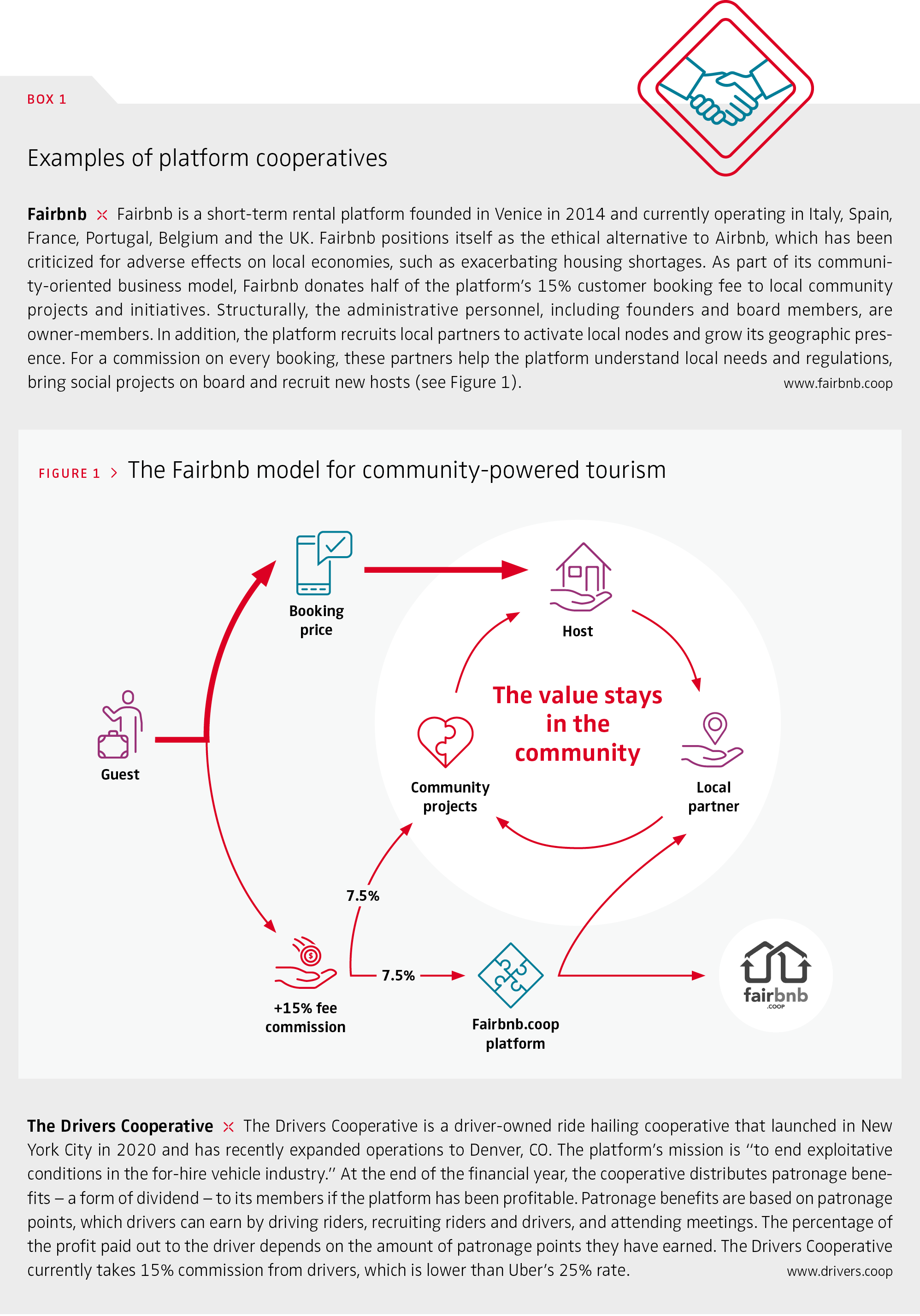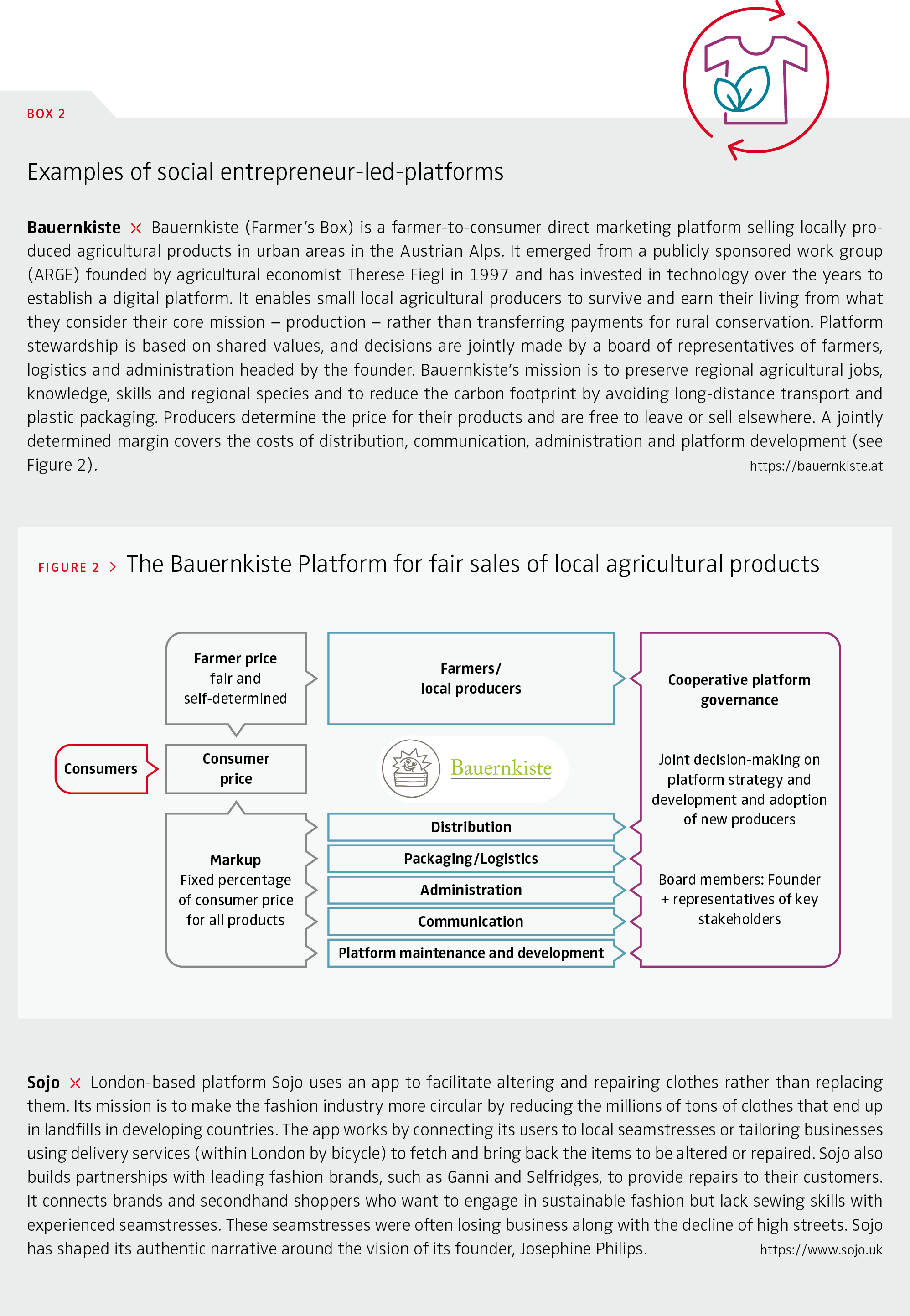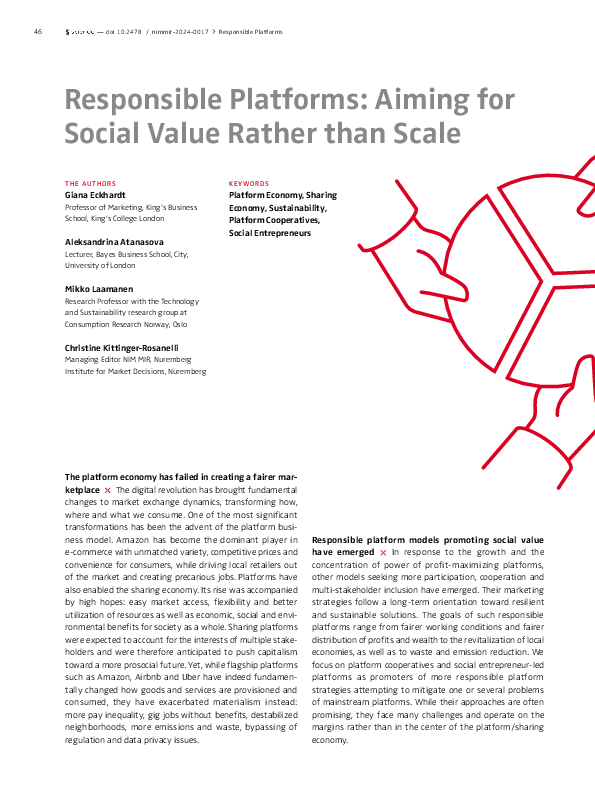Responsible Platforms: Aiming for Social Value Rather than Scale
The platform economy has failed in creating a fairer marketplace
The digital revolution has brought fundamental changes to market exchange dynamics, transforming how, where and what we consume. One of the most significant transformations has been the advent of the platform business model. Amazon has become the dominant player in e-commerce with unmatched variety, competitive prices and convenience for consumers, while driving local retailers out of the market and creating precarious jobs. Platforms have also enabled the sharing economy. Its rise was accompanied by high hopes: easy market access, flexibility and better utilization of resources as well as economic, social and environmental benefits for society as a whole. Sharing platforms were expected to account for the interests of multiple stakeholders and were therefore anticipated to push capitalism toward a more prosocial future. Yet, while flagship platforms such as Amazon, Airbnb and Uber have indeed fundamentally changed how goods and services are provisioned and consumed, they have exacerbated materialism instead: more pay inequality, gig jobs without benefits, destabilized neighborhoods, more emissions and waste, bypassing of regulation and data privacy issues.
Responsible platform models promoting social value have emerged
In response to the growth and the concentration of power of profit-maximizing platforms, other models seeking more participation, cooperation and multi-stakeholder inclusion have emerged. Their marketing strategies follow a long-term orientation toward resilient and sustainable solutions. The goals of such responsible platforms range from fairer working conditions and fairer distribution of profits and wealth to the revitalization of local economies, as well as to waste and emission reduction. We focus on platform cooperatives and social entrepreneur-led platforms as promoters of more responsible platform strategies attempting to mitigate one or several problems of mainstream platforms. While their approaches are often promising, they face many challenges and operate on the margins rather than in the center of the platform/sharing economy.
Responsible platforms are not as widespread as leading platforms but are able to challenge “hypercapitalist” models from the margins.

Platform cooperatives embed solidarity between users and owners and make sure that all stakeholders benefit from innovation and platform efficiencies.
> Platform cooperatives
This challenger business model replicates technology developed by mainstream platforms but has ownership models that include employees, consumers or other stakeholders. Platform cooperatives embed solidarity between users and owners and make sure that all stakeholders benefit from innovation and platform efficiencies. They are acknowledged as an egalitarian, communal and sustainable alternative to dominant platforms and a way to reimagine the platform economy. However, funding is often a challenge as platform cooperatives are less attractive to traditional investors because they provide lower returns on investment due to their profit-sharing models. Further, collective decision-making and the heterogeneity of diverse stakeholders can complicate cooperative governance and slow down operations. Direct competition with incumbents is therefore challenging. Box 1 describes two examples of platform cooperatives: Fairbnb in the home-sharing business in several European regions and The Drivers Cooperative, a ride-sharing platform operating in a few US cities.
> Platforms founded by social entrepreneurs
In contrast to platform cooperatives, the focus of social entrepreneurs is on building cooperations rather than shared ownership. Central figures and founders are individuals driven by a specific social mission. They build digital platform solutions to create social innovations and bring responsible change to specific communities or networks. Compared to commercial entrepreneurs, social entrepreneurs give higher priority to creating sustainable social value instead of short-term economic gains. Funding such platforms and their development is a big challenge for their founders. Funds typically come from venture capital, crowdfunding or dedicated government or state funds. The entrepreneurs can often link their mission to their own biography, which helps them shape authentic narratives to promote their cause and garner media coverage. Box 2 introduces two types of social entrepreneur-led platforms. Bauernkiste began as an analog platform and over time has improved its platform using digital technology. Sojo is an app-based platform born in the digital age.
Platform strategies for prosocial change in the market
Platforms with a responsible mission often find it difficult to gain substantial market share. Because of social and sustainability goals, such platforms tend to incur higher operational costs and need to charge higher prices. Even if there is a shift toward more consumer awareness of the adverse effects of mainstream platforms, responsible platforms haven’t yet revolutionized the marketplace. However, market challengers with responsibility-centered marketing strategies can decentralize the platform landscape by delivering a specific type of disruption, which we define as “change from the margins.” There are three strategic dimensions to this approach.
> Decentralizing the marketplace
Making social value the core mission can disrupt monopolistic tendencies of platforms by better catering to niche needs and not-yetserved market segments. In contrast to traditional strategic platform goals to scale up – that is, capture market share by growing in size – this approach can be seen as a form of scaling deep: seeking to create consumer commitment and loyalty by appealing to sustainability-oriented consumers who have so far found a lack of such offerings. Workers and platform partners do not only benefit from better pay, higher income and fairer treatment but also from being able to cater to new market segments. Drivers in The Drivers Cooperative noticed that the cooperative affords access to different types of customers – for instance the elderly in addition to businesspeople. The cooperative also formed business partnerships with larger accounts such as retirement homes and hospitals rather than directly competing for individual customers with Uber or Lyft. Sojo’s seamstresses were able to get access to digital natives who wouldn’t have entered their old-style stores without digital intermediation. And in the case of Bauernkiste, the farmers were able to serve an urban population formerly out of their reach.

Despite their smaller market share, responsible platforms can shape the public discourse about the distribution of wealth, power and consumption in important ways.
> Building institutional partnerships
Platform cooperatives can further destabilize the established structures and power dynamics of the sharing economy by promoting localized, networked collaborations between smaller service providers. This can be described as scaling out – replicating the platform’s business model across different locations to form partnerships with like-minded organizations or extending it with new partners. Several regionally dispersed platforms could build new ecosystems as alternatives to dominant players and shift the market power dynamics. In addition, scaling through institutions can help Fairbnb grow with municipal collaboration in new regions and countries, whereas The Drivers Cooperative can draw on specific service offerings to the health care sector as illustrated in their new focus on paratransit and non-emergency medical transportation. Sojo is extending its network beyond London and building relationships with delivery services and seamstresses in additional UK regions via partnerships with platforms such as Vestiaire Collective.
> Shaping authentic narratives
Despite their smaller market share, responsible platforms can shape the public discourse about the distribution of wealth, power and consumption in important ways. As the dominant platforms continue to fall under scrutiny, responsible platforms have been attracting attention from mainstream media, with leading outlets frequently and enthusiastically increasing their visibility. Charismatic and authentic social entrepreneurs can create buzz and serve as role models. Josephine Philips from Sojo was, for instance, featured in Wired and gave a TED Talk about sustainable fashion in 2023. Therese Fiegl has a prominent presence in regional media as a thought leader and networker for innovative and sustainable projects like and beyond Bauernkiste. Platform cooperatives like The Drivers Cooperative also leverage authentic stories about their values as part of their strategic practice. Such dissemination of responsible platform approaches through media or word of mouth can have a substantial influence on marketplace dynamics and inform various stakeholders’ perceptions. These platforms are thus able to demonstrate the original sharing economy value of prosociality. They demonstrate that platforms building on sustainable economic and social change can compete in the sharing economy, albeit at a smaller level than the mainstream platforms.
Even if responsible platforms are not as widespread as leading platforms, they are able to challenge “hypercapitalist” models. From their niches, they incrementally but consequentially influence platform dynamics more broadly, engendering change from the margins and moving incumbents to change and consumers to act in more responsible ways. Being small is not equal to being powerless.
FURTHER READING
Atanasova, A., Eckhardt, G. M., & Laamanen, M. (2024). Platform cooperatives in the sharing economy: How market challengers bring change from the margins. Journal of the Academy of Marketing Science.
Laamanen, M., Forno, F., & Wahlen, S. (2022). Neomaterialist movement organizations and the matter of scale: Scaling through institutions as prefigurative politics? Journal of Marketing Management, 39(9–10), 857–878. doi.org/10.1080/026725 7X.2022.2045342
Scholz, T. (2023). Own this!: How platform cooperatives help workers build a democratic Internet. Verso.
Schor, J. (2020). After the gig: How the sharing economy got hijacked and how to win it back. University of California Press.










